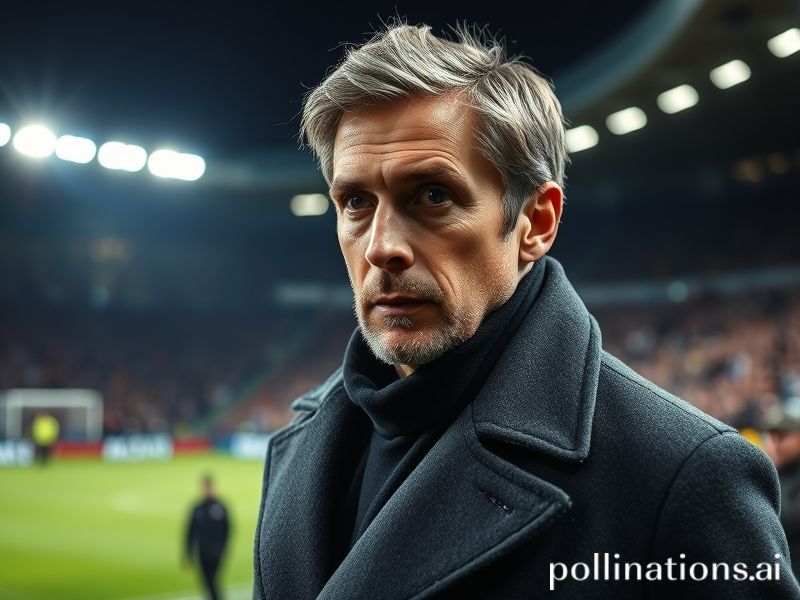Thomas Tuchel: Football’s Perennial Exile and the Global Theater of Managerial Whiplash
Thomas Tuchel: Football’s Last Cosmopolitan, Packing His Suitcase Again
By A. Verlaine, International Desk, somewhere over the Atlantic
The news pinged across time zones like a low-budget Bond film title card: Tuchel Leaves Bayern. In Tokyo salarymen smirked into their miso, in Lagos betting shops recalibrated odds, and in Washington think-tankers—who still believe “soccer” is a data set—shrugged at another European melodrama. Yet Thomas Tuchel’s perpetual motion is more than a Bundesliga HR form; it is a snapshot of a planet that outsources its emotions to 22 millionaires kicking geometry across grass, then wonders why the grass keeps catching fire.
Tuchel, 50, has become the itinerant professor of football’s gig economy: Mainz, Dortmund, Paris, London, Munich—collect the fridge magnet, update the LinkedIn. Each departure follows the same choreography: a press-conference smile brittle enough to frost windows, a club statement praising “mutual respect,” and fans discovering that “project” is just Latin for “until the next quarterly report.” Bayern’s version came wrapped in Bavarian politeness: “We thank Thomas for the treble memories,” roughly translates as “Don’t let the edelweiss hit you on the way out.”
The global significance? Observe how the world now consumes managerial sackings like Netflix true-crime: binge, theorize, forget. When Tuchel was dismissed by Chelsea—a club owned by a sanctioned oligarch, headquartered above a Knightsbridge noodle bar—his exit interview trended in Seoul. South Koreans, whose own K-League coaches last about as long as a kimchi craving, recognized the universal dialect of scapegoat. Meanwhile, Manchester United fans in Jakarta offered him asylum, proving fandom is no longer territorial but transactional; we are all digital vultures circling the same carcass.
Tuchel’s passport tells the geopolitical story. At Mainz he was the cerebral German par excellence, the coach who read Kant between corner kicks. In Paris, he learned to navigate Qatari soft power and Neymar’s mood swings—skills now marketable at any G20 summit. In London, he became an accidental diplomat, calming geopolitical storms with a half-smile and a back three. Somewhere along the way, he acquired the weary cosmopolitanism of a man who has argued over hotel breakfast buffets in seventeen languages. One imagines him at 3 a.m. in an airport lounge, watching CNN muted, mouthing “high press” at the crawl.
The irony, of course, is that Tuchel’s tactical brain—once celebrated as the future—is now judged by the same clickbatean tribunal that elevated it. Football’s attention span is shorter than a TikTok dance. Yesterday’s genius is today’s “toxic dressing-room influence,” a phrase that could apply equally to a coach or a badly stored durian. Bayern’s squad reportedly stopped listening to him, a revelation shocking to anyone who has never met twenty-five millionaires told since childhood that their feet were dipped in gold.
What next? The rumor mill spins like a washing machine with a brick inside. Barcelona’s financial levers are actually just IOUs written on sangria napkins; Real Madrid’s vacancy is reserved for whichever deity Florentino fancies this month; the U.S. national team dangles the promise of 2026 World Cup legacy and unlimited Starbucks. Wherever Tuchel lands, the script is pre-written: initial honeymoon, tactical honeymoon, tactical divorce. The planet will watch, tweet, and move on to the next sacrificial tactician. In a world where governments collapse and glaciers retreat, football still believes it can fire its way to happiness.
And so Thomas Tuchel wheels his Rimowa through another departure lounge, a modern Flying Dutchman in trainers, searching for a port that will finally pronounce his name correctly. The suitcase is lighter—titles weigh less than regret—and the boarding pass reads, simply, “Gate Unknown.” Somewhere, a data analyst updates the probability model; somewhere else, a child in Nairobi paints his name on a cardboard jersey. The cynic in me notes that both acts are equally futile, yet the romantic—buried under layers of airport coffee and sarcasm—admits this circus is the closest humanity gets to collective ritual. Until the next ritual sacrifice arrives, Tuchel remains our roving reminder: in the global village, the manager is the new exile, forever packing, forever promising, forever gone.







